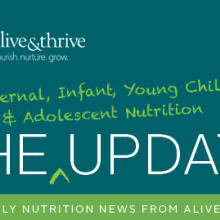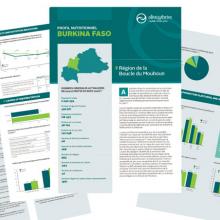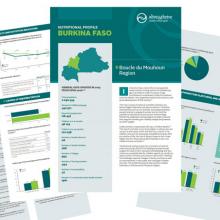Journal article
Jul 16 2020

Predictors of exclusive breastfeeding and consumption of soft, semi-solid or solid food among infants in Boucle du Mouhoun, Burkina Faso: A cross-sectional survey (Cresswell, J., 2017. PLOS ONE)
Many mothers have low levels of knowledge regarding breastfeeding and demonstrate poor practices, according to this cross-sectional survey (n = 2288) of a representative sample of women aged 15–49 years with at least one live birth in the past year conducted during June and July 2015 in the Boucl
Announcement
Jun 01 2020

The Maternal, Infant, Young Child & Adolescent Nutrition Update newsletter
Click below to read past editions of the MIYCAN Update is Alive & Thrive's quarterly global newsletter.
Handout
Apr 21 2020

Profils nutritionnels de six régions du Burkina Faso
Handout
Apr 21 2020

Burkina Faso Nutrition Profiles for Six Regions
These nutrition profiles present MIYCN data for six regions of Burkina Faso, including data on health and nutrition indicators, causes of undernutrition, nutrition promotion platforms and antenatal and child health care, and global nutrition targets.
Journal article
Feb 25 2020

The cost of not breastfeeding: global results from a new tool (Walters, D., 2019. Health Policy and Planning)
A billion dollars and two thousand lives, every day. This impactful study, which is the foundation for Alive and Thrive’s online tool, examines the human and economic costs of not breastfeeding.
Journal article
Feb 21 2020

Social, economic, and political events affect gender equity in China, Nepal, and Nicaragua: a matched, interrupted time-series study (Nguyen, T., 2020. Global Health Action)
This study suggested that supportive social and political environments can play an important role in empowering women, which in turn advances human rights and promotes health and well-being of individuals, households, communities, and countries.

